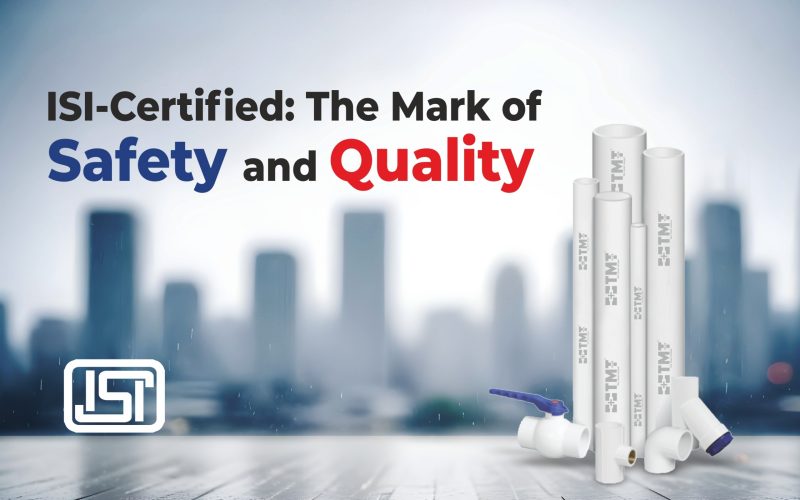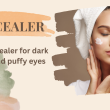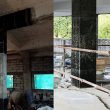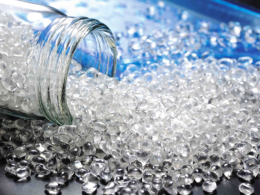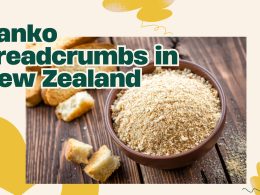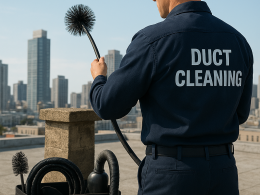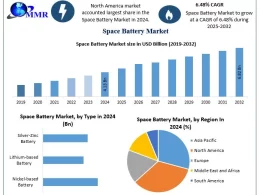PVC Pipes Sure Have Come a Long Way. Once considered more of a luxury, they now represent the standard when it comes to plumbing systems in home, business, agricultural and even industrial applications. It’s not hard to see why they are so popular — they’re lightweight, easy to put in, incredibly durable and even relatively inexpensive to purchase.But there’s a catch: not all PVC pipe is compatible.
As a growing need for PVC pipe has emerged, so has the onslaught of inferior products on the market. These lower-cost alternatives may seem similar from the outside, but the inside is a completely different tale. Just a few examples are poor material quality, varying wall thickness and poorly executed manufacturing can bring about actual problems over time – leaks, breakage, contamination, and complete system failure.
What are ISI-Marked Pipes?
ISI-marked pipes are certified by the Bureau of Indian Standards (BIS) to meet quality, safety, and performance standards. The ISI mark ensures the pipes are durable, reliable, and manufactured as per Indian regulations. Commonly used in plumbing, agriculture, and construction, these pipes offer assurance of consistent quality and are trusted for long-term, efficient use.
What are the Hidden Risks of Using Non-ISI Marked PVC Pipes?
Substandard Material Quality
Non-ISI-marked PVC pipes often contain recycled or inferior materials. These compromise strength and chemical resistance, making them prone to cracks or leaks under pressure. Over time, this results in plumbing failures and costly repairs. The short-term savings come at the expense of long-term safety, reliability, and system performance.
Unsafe for Drinking Water
Non-ISI uPVC plumbing pipes are not tested for food-grade safety and may leach harmful chemicals or heavy metals into the water. This poses serious health risks, especially when pipes are exposed to heat or sunlight. Using uncertified pipes for drinking water supply is a major hazard and should be strictly avoided.
Poor Resistance to UV and Heat
Non-ISI pipes often lack UV stabilisers and heat resistance. When exposed to sunlight or high temperatures, they become brittle, deform, or crack. This is especially dangerous in outdoor installations or hot water lines, where pipe failure can compromise the safety of the system and cause significant inconvenience or damage.
Shorter Lifespan
Due to poor manufacturing and inferior raw materials, non-ISI pipes have a limited service life. They deteriorate quickly, requiring frequent replacements. This leads to higher long-term costs and greater disruption. Unlike certified alternatives, they fail to withstand environmental stress, water pressure, or chemical exposure over time, making them a poor investment.
Inadequate Pressure Handling
Without standardised pressure ratings, non-ISI pipes may not withstand normal water pressure in residential or commercial settings. This increases the risk of bursting or leakage, especially in multi-storey buildings or irrigation setups. Inadequate pressure handling can lead to sudden failures, property damage, and increased maintenance requirements, making them an unreliable choice.
Weak Joints and Fittings Compatibility
These pipes often don’t match standard dimensions, making them incompatible with regular fittings. Poor alignment and weak joints increase the chance of leaks or bursts. Improper sealing not only affects functionality but also causes water wastage and damage, leading to expensive repair work and reduced plumbing system efficiency.
No Compliance with Building Codes
Non-ISI marked pipes don’t meet national safety standards. Their use may lead to failed construction inspections, legal consequences, or rejection of insurance claims in case of damage. Non-compliance can stall projects or result in heavy penalties, making them a liability in any construction or renovation project.
Hidden Installation Challenges
These pipes often have irregular sizing and inconsistent wall thickness, complicating installation. Plumbers may struggle with sealing, alignment, or pressure testing. These complications increase labour time, costs, and the likelihood of errors. What initially appears to be a cost-saving choice often results in time-consuming and expensive installation problems.
Why Should You Use ISI-Marked PVC Pipes?
Certified Material Quality
ISI-marked pipes by leading uPVC pipes manufacturers are made using virgin, high-quality materials under strict quality standards. These pipes offer consistent strength, corrosion resistance, and reliability. Their superior material quality ensures safety in all types of plumbing systems and drastically reduces the chances of premature failure, making them a trustworthy option for long-term use.
Standardised Pressure Ratings
Each ISI-marked pipe is pressure-tested and rated for specific applications. This ensures the pipe can safely handle various flow conditions, whether for underground networks or high-rise buildings. Standard pressure markings provide clarity to installers and reduce the risk of bursting, leakage, or failure under normal or heavy water flow.
Long-Term Durability
ISI-certified pipes are built to last. Their resilience to weather changes, chemical exposure, and physical stress makes them ideal for long-term installations. Unlike uncertified pipes, they don’t crack, warp, or degrade easily, minimising repair and replacement needs and delivering dependable performance over many years.
Safe for Potable Water Supply
ISI-marked PVC pipes are thoroughly tested to ensure they’re non-toxic and suitable for carrying drinking water. They do not leach harmful chemicals into the water, even under heat or pressure. This makes them a safe, hygienic choice for households, commercial buildings, and public water supply systems.
Compatibility with Standard Fittings
With precise dimensions and uniform thickness, ISI-marked pipes ensure perfect compatibility with standard connectors and fittings. This prevents joint leakage, simplifies installation, and improves system efficiency. Their standard sizing also reduces the need for adjustments during plumbing work, saving time and labour.
UV and Heat Resistance
ISI-certified pipes include additives that protect them from UV radiation and thermal stress. This means they won’t crack or weaken under sunlight or hot water conditions. Their ability to withstand extreme weather makes them ideal for external, exposed installations or industrial applications involving temperature variations.
Compliant with Construction Norms
Using ISI-marked uPVC pipe fittings ensures full compliance with national building codes and safety regulations. This simplifies approvals from local authorities and eliminates legal risks. Whether you’re handling residential, commercial, or infrastructure projects, these pipes meet all required standards and boost your project’s credibility and safety profile.
Trusted Brand Assurance
ISI certification is issued by the Bureau of Indian Standards (BIS) after extensive testing and audits. It acts as a quality seal, assuring buyers that the product meets all necessary performance, safety, and reliability benchmarks. Choosing ISI-marked pipes means choosing products that have earned trust through rigorous evaluation.
Impact of Substandard Pipes on Water Wastage and Environmental Impact
Substandard PVC pipes lack proper strength and sealing and are prone to leaks, resulting in significant water wastage. These leaks not only increase water bills but also contribute to the overuse of precious water resources. Over time, this inefficiency can lead to costly repairs and maintenance, further escalating the financial burden on property owners and communities.
When low-quality pipes break down, they often release harmful chemicals into the environment, contaminating soil and water sources. Their inability to withstand UV rays and temperature fluctuations leads to premature degradation, contributing to environmental pollution. This creates long-term ecological damage, as non-biodegradable materials from the pipes can persist in the environment, impacting plant and animal life.
Choosing the right PVC pipes is essential for the safety and longevity of any plumbing system. While non-ISI marked pipes may seem affordable, they often compromise on quality, durability, and compliance with safety standards. This can lead to frequent repairs, health risks, and added costs over time. ISI-marked pipes, on the other hand, ensure consistent performance and peace of mind. Investing in certified products from reputed brands helps avoid future issues and supports a more efficient, reliable plumbing infrastructure in the long run.






